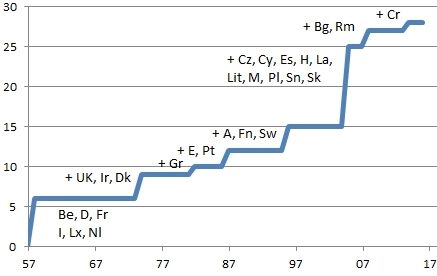The European Onion*
|
| Refugees!
All of a sudden! Since many months they appear by thousands at the
coasts and at the borders of Good Old Europe, desperately longing for a
safe harbor. And Good Old Europe, this slowly progressing project
encompassing half a billion people now, is obviously confused. Not that we Europeans wouldn't know how to deal with refugees
in a constructive way. We had to deal with millions of them during the last
100 years. These were mostly Europeans, people like us. But these new
refugees... Either they are black; or they are muslims; or they are
even both of these. |
| Three
years ago (it was February too), I spent two weeks in Haifa, the home
town of my wife. I did this without any 'touristic' feelings. We had to
take care about a former apartment of hers, did some renovations there,
frequented the local shops. Due to our tight relation I soon began to
feel familiar with the neighborhood, although the atmosphere was very
different from the atmosphere in my hometown Vienna. And this starts
with such fundamental things as astronomy and climate: for my European
standards, this Haifa-February was no February at all. |
| Now,
I wonder what on earth drove one and a half million residents of
southerly latitudes northwards to Austria, to Germany, and even as far
as to Sweden? What did they expect to find there? Will they not be
sorry, now, during European winter, waiting desperately for the return
of daylight?
Probably they are, but most of them had no other choice. 'Arab Spring'
is the culprit. Nobody ordered that kind of 'Spring'. It happened. We
can only hope that, one day, it will really develop into something more
peaceful, something nice - as the word 'spring' suggests. |
| But
for the time being, we must find some comfortable arrangements with our
unexpected guests.
On first glance, you might think - astronomic and climatic
inconveniences left aside - that 500 million Europeans should easily
accomodate short- or middle-term shelter for a few million desperate
people deprived of their homes. But as it looks now, these 'Europeans'
have big troubles coming to terms with their own identity. Apparently,
they still feel as Europeans to differing extents. This European
Union almost feels like a European onion, with several layers. |
| As we all know: peeling the onion may return a pile of pellicles,
finally with no onion left. However, not only the member states feel
responsibility for the whole to differing extents; also the refugees
seeking admission seem to have just a few of the 'central members' on
their agenda. For the moment, the problem is preliminarily solved by
centrally directed distribution to all parts of the most accessed EU
members. Distribution to other EU members did not yet succeed, but
should in principle be possible as well, if (1) the EU would act as a
union and (2) would be perceived as a union by the refugees. |
| If
I would have to seek admittance abroad, driven away from my home, I
also would probably have certain preferences. But surely I would also
understand that I need some minimum of flexibility. I should have a
plan B, and I am sure that also the actual refugees have their plans B.
We are all humans, and humans communicate. We must find the best
solutions together. Exactly this is happening quite now: We all
together, refugees and hosts, are looking for solutions. This means a
lot of discussions, many meetings, and of course also lots of emotions. |
| We
should not be afraid of these emotions. We should talk about them. We
should not lie into our faces: everything is fine. It is not fine,
because it is a tense situation. People lost their homes, lost their
close relatives, have been traumatized. They need help. And they are
millions. The situation needs the concerted efforts of more than just a
few emergency specialists. As a whole, the European Union is powerful
and skilled enough to provide this necessary help. Maybe it will still
take some time until all members realize what they are part of. |
1/16 < MB
(2/16) > 7/16
|
*The term "European Onion" was coined by Jan-Emmanuel De Neve from the University of Oxford in 2007 (J Europ Integr 29, 503-521).
See also: Bansak K, Ferwerda J, Hainmueller J, Dillon A, Hangartner D,
Lawrence D & Weinstein J (2018) Improving refugee integration
through data-driven algorithmic assignment. Science 359, 325-29
|

